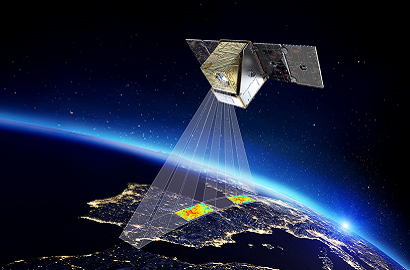Thales Alenia Space leads Sirius space mission from Spain

The joint venture has been chosen by the ESA to monitor urban heat islands from space.
From its headquarters in Tres Cantos (Madrid), Thales Alenia Space will lead the development of Sirius, a space mission that aims to respond to growing environmental and sustainability challenges. Its main objective will be to monitor urban heat islands. To do this, it will observe European cities from space by using thermal infrared (TIR) sensors capable of measuring urban surface temperatures with high precision.
Thales Alenia Space, owned by France’s Thales (67%) and Italy’s Leonardo (33%), has been selected by the European Space Agency (ESA) to perform the study for the Sirius (Space Based Infra-Red Imager for Urban Sustainability) mission, which is part of the Scout missions under the ESA’s FutureEO Earth observation programme.
Scientific approach
The ESA’s Scout missions aim to test new concepts in the field of Earth observation with a scientific approach, while also providing an agile, fast and low-cost result. Each of these missions has a limited budget of 35 million euros, including the launch, and will be completed within a maximum of three years from the start of implementation to flight acceptance.
Night-time observations of several European cities, with a native resolution of 64 metres, will be carried out for three years, and could be extended in the future. The Smart-TIRI developed by Thales Alenia Space will be used, a miniaturised instrument employing an innovative detection solution that avoids the need for expensive cooling systems.
Infrared thermal sensors
Infrared thermal sensors allow the temperature of objects to be measured from a distance. Through this mission, Thales Alenia Space will try to reveal how urban heat islands modify the local climate. These urban heat islands are areas in cities where temperatures are higher than in the surrounding rural areas, an effect that occurs as a result of heat accumulation on impervious surfaces with little vegetation and human activity. It is at night that the temperature difference between cities and rural areas is at its highest – as much as 12 °C.
Thales Alenia Space’s CEO in Spain, Ismael Lopez, said, “We are very pleased to have the ESA’s support for the Sirius mission study, based on our Smart-TIRI instrument – an innovative, compact, high-performance and cost-competitive technology. This Spanish-led solution adapts very well to different applications of great environmental and sustainability interest, such as monitoring urban heat islands – a growing phenomenon with major health, environmental and socio-economic implications.”
Photo: Thales Alenia Space




